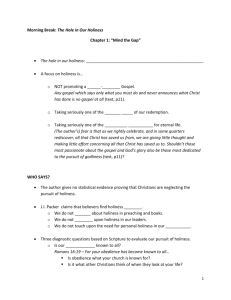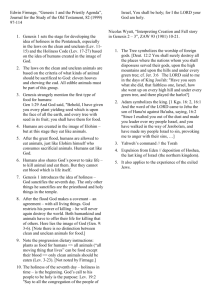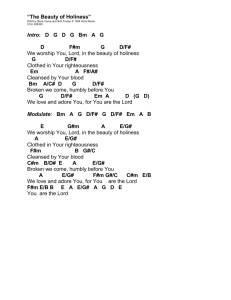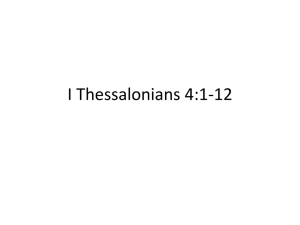Unholy Man And Holy God
advertisement
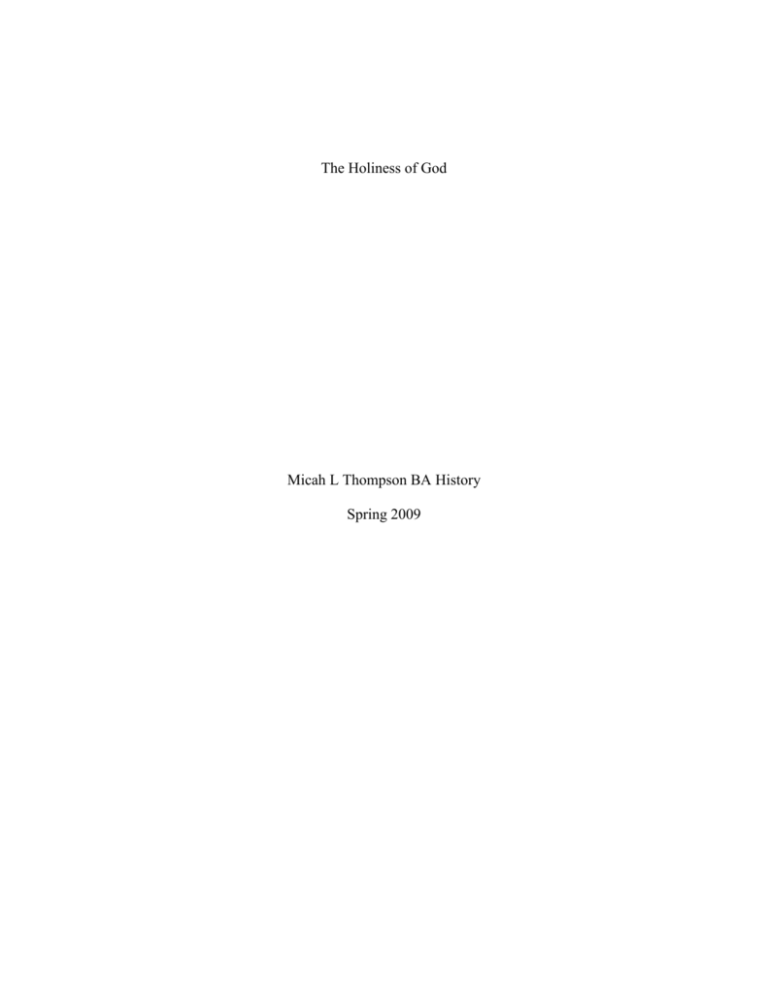
The Holiness of God Micah L Thompson BA History Spring 2009 Thesis Statement The one true holy God requires that man approach Him with appropriate reverence and a clean heart. Although God is longsuffering, those who persistently disregard His holiness will receive just punishment. 2 Table of Contents Introduction………………………………………………………………………………4 The Nature of God’s Holiness…………………………………………………………..4 Experiencing God’s Holiness……………………………………………………………5 God’s Understanding of Our Lack of Holiness………………………………………...7 Becoming Holy…………………………………………………………………………...8 Rules of Holiness…………………………………………………………………………9 Approaching God’s Holiness…………………………………………………………..12 The Church and Holiness………………………………………………………………14 Conclusion………………………………………………………………………………15 3 Introduction Most men have no problem believing in God, but man has always struggled with the question of how God relates with the universe. Cicero stated, “Nature herself has imprinted on the minds of all the idea of God,” but how are we to communicate with God? There is a gap between God and man. It has been the goal of all religions to bridge this gap that separates a holy Divinity from an unholy man, and to provide a way for man to communicate with God. In the Old Testament, God chose to communicate with His own people through personal communications with a few select leaders and prophets. The personal communications were recorded and communicated to the population at large. We still have these communications today in the form of the Old Testament. Besides communicating indirectly with the general population, God periodically used cosmic miracles. If we want to know how to communicate with God we must learn from these communications and miracles of the Old Testament. They will teach us the key element to God’s character so we the church can communicate rightly with Him today. 1 The Nature of God’s Holiness The Church has gradually lost sight of the true nature of God. It has slowly, but steadily substituted knowledge of a transcendent holy God for a delusion that God is lowly and common. This mundane false god of many believers is not worth the worship that is accorded to the true Almighty.2 Often contemporary Christians lack an appropriate appreciation of God’s holiness. Many will think of God as a loving friend or parent, or even as a judge, before they will think of Him as holy. Because God is not uncaring or distant, we think we can approach Him the way we would an equal. This is not the case. Although God desires to have a close relationship with us, it Herbert A. Youtz, “Three Concepts of God.” The American Journal of Theology 11, no. 3 (July., 1907): 431- 432. 2 A.W. Tozer, The Knowledge of The Holy (New York: HarperCollins, 1961), vii. 1 4 does not mean that we can approach in any manner we desire. It is not possible to have a real relationship with someone without fully understanding the character of the person. The same is true with God. If we want to have a real relationship with Him, we must endeavor to truly understand His character and not view Him as merely the object of sentimental devotion, or as the One who is there fulfill every human desire.3 It is important to have an accurate understanding of the meaning of holiness if we are to understand God. That which is holy has been set apart from all that is profane or common. In order for something to be holy, it must be uncorrupted by the taint of sin. Holiness is what separates God from His creation. Holiness is the most essential element of God’s character. Holiness is what makes Him totally unique. There is God, and then there is everything else. Nothing that God has created is in the same category as He. Moses composed a song that teaches us how God’s holiness makes Him different from anyone or anything else. Exodus 15:11, "Who is like You among the gods, O LORD? Who is like You, majestic in holiness, awesome in praises, working wonders?4 Experiencing God’s Holiness Perhaps no event in the Old Testament tells us more about the holiness of God than the theophany experienced by Isaiah. Even the timing of God’s appearance is significant. King Uzziah had just died. Uzziah had been an extremely competent king. Uzziah’s reign had been long and brought prosperity to Judah. His death brought political uncertainty. Isaiah was well Gregory Jones, “God’s Holiness,” Christian Century (October 1999): 1004. Chip Ingram, God As He Longs For You To See Him (2004; repr., Grand Rapids: Baker Books, 2008), 105-06. 3 4 5 aware of how tenuous Judah’s position was. The victorious Assyrian king Tiglath-pileser III threatened Judah. With Uzziah their champion gone, how would Judah defend itself?5 It was in the midst of this hopeless situation that God made His appearance to Isaiah. According to John 1:18, no one has ever actually seen God. Therefore, we can deduce that Isaiah saw vision of heaven illustrating the holiness of God, and not an actual sighting of God. We are told God is enthroned in a temple. No physical description of the Lord is given, but He is surrounded by symbolic imagery. Heaven is filled with God’s throne and his winged attendants. The joyous announcements in God’s heavenly palace-temple are contrasted with mourning in Uzziah’s earthly temple.6 Even the seraphim attending to God are divinely equipped to work in the presence of the supremely holy God. Isaiah 6:2, “Seraphim stood above him, each having six wings: with two he covered his face, and with two he covered his feet, and with two he flew.” Unlike humans, the seraphim do not have a sinful nature, but even they must cover their faces in the presence of God. The pair of wings to cover their feet reminds us of God’s command for Moses to remove his shoes while on holy ground. Feet are representative of created beings. The seraphim, while purely spirit beings, are still creatures and they too must draw attention away from themselves in the presence of God. The last set of wings was so they could fly7 The most powerful part of Isaiah’s vision of the seraphim is not their covered feet or faces, nor even their ability to fly, but their song:8 the Trisagion, which means “three times holy.” I believe the seraphim’s song to be one of the most theologically significant passages in 5 Walter C. Kaiser Jr. The Majesty of God In The Old Testament (Grand Rapids: Baker Academic, 2007), 147-148. 6 Ibid, 149. 7 R.C. Sproul, The Holiness of God, 2nd ed. (Wheaton: Tyndale House, 1985), 23. 8 Kaiser, The Holiness of God, 148. 6 the Bible. The Hebrew language uses repetition for emphasis. This can be seen in the New Testament as well. Jesus would preface His statements by saying, “Truly, truly.” There are only a few instances in the Bible where something is emphasized by elevation to the third degree. In Revelation 8:13, the eagle pronounces God’s judgment on the earth, “Woe! Woe! Woe to the inhabitants of the Earth….” Jeremiah 7:4 states, “This is the temple of the LORD, the temple of the LORD, the Temple of the LORD!”9 By stating that God is holy three times over, the seraphim are stating that God’s holiness is the most notable thing about Him. Holy is the only characteristic of the Lord mentioned three times in succession. God is not “loving, loving, loving,” “ mercy, mercy, mercy,” or “even justice, justice, justice,” but He is “holy, holy, holy!”10 God’s Understanding of Our Lack of Holiness Not only is it necessary to understand holiness before we can understand God, but it is also important that we understand holiness so we will know how God sees us. Chances are that no one would ever fully understand their own sinful nature unless they were confronted by God’s holiness. Man is accustomed to his own lack of holiness, and as long as things do not get too far out of hand, sinfulness does not bother him. For example, we do not expect or require that our political or business leaders to be completely honest, or even our friends to be completely faithful.11 God must heal our minds before we can understand His holiness or man’s lack thereof. Only God through the Holy Spirit is capable of bringing man to a proper understanding of His holiness. It is possible for man to have some mental understanding of God’s holiness, but that 9 Sproul, The Holiness of God, 24 Kaiser, The Majesty of God In The Old Testament, 148 11 Tozer, The Knowledge of the Holy, 104 10 7 knowledge will not produce any faith unless the Holy Spirit brings us to it. The Holy Spirit illuminating that knowledge produces the faith that changes and affects the way that we live our lives. 12 Becoming Holy When Isaiah was brought to an understanding of God’s holiness, it was a very traumatic and painful experience for him. The temple shook and the room was filled with smoke. We know that Isaiah instantly understood how short of the mark he had fallen, because he immediately called for destruction to be brought on him. This is contrasted with the first five chapters of Isaiah where Isaiah pronounced destruction on Israel for their sins. Now in the presence of the Lord, Isaiah called for destruction to be brought on himself for his own sins. Isaiah’s humble attitude can be contrasted with the arrogance of King Uzziah who had entered the temple where only the priest were allowed to go.13 “Then said I, Woe is me! for I am undone; because I am a man of unclean lips, and I dwell in the midst of a people of unclean lips: for mine eyes have seen the King, the LORD of hosts. Then flew one of the seraphims unto me, having a live coal in his hand, which he had taken with the tongs from off the altar: And he laid it upon my mouth, and said, Lo, this hath touched thy lips; and thine iniquity is taken away, and thy sin purged.” Isaiah 6:5-7 Mercifully, God cleansed His appointed messenger Isaiah. Without Isaiah asking, or His even requiring anything on Isaiah’s part, God chose to take the initiative and cleanse Isaiah. The coal that touched Isaiah’s lips had no power in itself. The power came from God. God is the one that paid the price to cleanse Isaiah’s mouth so he could be an effective communicator for the Lord. Before anyone can know or be fully used by the Lord, he must realize God’s holiness and be cleansed. God does the cleansing, but we, like Isaiah, may find it to be a very painful 12 13 Ibid, 104 Kaiser, The Majesty of God In The Old Testament, 150. 8 experience. Once we truly understand God’s holiness and His mystery, we, like Isaiah, will be eager to say, “ Here am I Lord, send me!”14 In the Old Testament only those who were ritually clean could approach God. God gave complex rituals defining how He was to be approached. The purpose of the rituals was not to satisfy the anxieties of the Israelite, but to unify the whole community and teach them to observe the sanctity of God’s presence and that that had been consecrated to Him. If any one member of the community failed to recognize God’s holiness, that member had to be cleansed ritually or purged from the community so his lack of holiness would not endanger the rest of the congregation. It did not matter if the infraction was a violation of a ritual law or a moral law, because both of these violated the holiness of which was a very serious matter. The laws that were given by God were to communicate the nature of God’s holiness to man. It does not matter if it was an ethical or a ceremonial law15 Rules of Holiness Due to the differences between God’s holiness and man’s, there are rules and limitations that must always be observed when communing with God. Any violation of these rules, either intentional or unintentional, can be disastrous to the violator of God’s holiness. What unholy man thinks to be important or just is not what matters, but what the one holy God desires is what is truly important. There are many examples throughout the Old Testament where those who did not give proper respect to God’s holiness were promptly dealt with and punished.16 The Old 14 Ibid, 152. John P. Peters, “The Hebrew Idea of Holiness,” The Biblical World 14, no. 5 (Nov., 1899): 354. 16 Ibid, 344-345. 15 9 Testament communicates just how seriously God takes His holiness and how seriously He expects us to take His holiness. One example is that of Nadab and Abihu. Both were priests and sons of Aaron who had been specifically chosen by God to be the first high priest of Israel. In Leviticus 10:1-2, both of these priests used “strange fire” when offering incense to the Lord. Because of these priests’ liturgical innovation, they were summarily executed and consumed by fire with no trial. To the average man strange fire does not sound that bad. Nadab and Abihu did not offer a human sacrifice or something equally despicable, but neither did they observe God’s holiness in the manner He required. When Moses learned of the incident he declared to Aaron, “This is what the LORD meant when He said: I will show My holiness to those who are near Me, and I will reveal My glory before all the people." (Leviticus 10:3) Nadab and Abihu drew near to God and His glory was revealed, but because they did it in an improper way they paid for it with their lives.17 A second example is found in I Samuel 6:20. The Lord slaughtered many people at Bethshemesh because the men of the town decided to look inside the Ark. These men were quite irreverent by prying and looking inside the Ark when it was not their place to do so. These men thought they could pry their way into God’s holiness. Again man approached God, and again God communicated His holiness to man by killing them because they approached Him improperly.18 The third example also involves death and the Ark (II Samuel 6:1-11). If the first two stories are offensive to a corrupted sense of justice, the story of Uzzah will definitely be shocking. David had just ascended the throne and in the process of strengthening his rule, he 17 18 Sproul, The Holiness of God, 100-102. Peters, “The Hebrew Idea of Holiness,” 345. 10 ordered that the Ark be retrieved from the Philistines who had captured it and placed in a central location. The Ark had been placed on an ox cart. The oxen faltered, and the Ark almost tumbled to the ground. Uzzah used his hand to steady the Ark. It might be thought that he saved the day, but for his efforts God struck him dead. Again, right on the spot with no judge or jury. God had a very specific method He wanted employed in moving the Ark. God had consecrated a specific family, the Kohathites to move the Ark; but they were to do it with polls fitted through rings fixed to the Ark. The Kohathites were given the privilege of moving the Ark, but they were not permitted to look at the ark or to touch it. The penalty for doing so was death. Uzzah should have known better, no exception was given to allow the ark to moved by ox cart. We must also consider what Uzzah was saving the ark from: the ground. Uzzah was foolish to think that he was better than the ground. The ground is not tainted by sin, and the ground was doing what God created it to do. Uzzah, on the other hand, was not doing what God had created him to do.19 Nadab and Abihu, the people of Beth-shemesh, and Uzzah were all killed for violating ceremonial laws, but holiness requires more than just the obedience to ritual laws. There is also an ethical requirement that must be observed as well. While he was pronouncing woe on the Israelites, Isaiah in chapter one lamented over how his countrymen were evildoers and corrupt despising the Holy One of Israel. The people of Judah had never failed to offer the appointed sacrifices of rams and bulls. The Israelites continued to celebrate the Sabbath and all religious holidays, but they offended God and brought judgment on themselves because of their moral shortcomings. Again, God manifested His holiness by punishing and destroying sinners for their 19 Sproul, The Holiness of God, 104-108. 11 moral transgressions.20 Approaching God’s Holiness How should we communicate with a holy God when we are unholy? Fortunately, unlike the mythical gods of the Hebrew’s neighbors, our God is consistent and unchanging. He never changes or adjusts His moral character. He will not compromise, qualify, or make exceptions that would compromise His holiness. All of His decisions are based on His holy character. There are never any inconsistencies: His righteousness is never contradicted by His mercy or His grace. We can learn what to expect from God’s holy character: forgiveness and salvation, as well as just judgment of sins. He is never fickle. He has taught us the way to appropriately approach Him.21 God is consistent and can be approached respectfully. We see examples of holy men who communicated with our holy God in the Old Testament. Moses spoke face to face with God. The Old Testament links a fear of God with walking with God. The Christian should live his life in the presence of God. Deuteronomy 10:12 and I Kings 8:23 say that a man who walks with God loves and serves God with all his heart. When we commune with God, we must respectfully fear Him, but at the same time we can trust Him and love Him. This is often easier to do in difficult times than it is in the good times. Possibly this is why the Lord appeared to Isaiah when he did: right after the death of Uzziah and while the threat of Assyria loomed.22 Fortunately for us, God desires to communicate with more than the few select individuals Peters, “The Hebrew Idea of Holiness,” 346-347, 351. George B. Stevens, “The Righteousness of God,” The Biblical World 25, no. 4 (Apr., 1905): 274-275. 22 John E. McFayden, “Communion With God In The Bible,” The Biblical World 33, no. 4 (Apr., 1909): 250-253. 20 21 12 that he has sent to us as witnesses of His holiness. The prophets served as teachers, and the Nazarites served as examples of spiritual purity. God invited all of us to seek Him in Amos 5:4, “seek Me and live.” This is an invitation from God to all people to approach Him and to enjoy His blessings. God is tender hearted and merciful. He showed great patience towards Israel. The nation continued to sin repeatedly without destruction. God repeatedly gave the Hebrews chances to repent and turn from their evil ways. When they failed to do so, His patience was exhausted. He lamented the Israelites’ destruction when He was finally forced to punish them for their chronic sinfulness. Although the Israelites deserved to be punished, God was sorry for their demise.23 God’s holiness is related to His righteousness. All of His moral attributes derive from His holiness. The virtue of God that is most often referenced is His faithfulness to the covenant promises that He has made to those that will trust and obey Him. God’s merciful nature closely follows His faithfulness, because He will keep His promises to us even when we do not deserve anything but the harshest punishment. God is merciful, but He is also just. These traits do not conflict with each other because they both derive from God’s holiness. God will always give to every man what he is due. God has His own divine law and expects all men to obey it. He has set the standard and has revealed it to man through divine revelation. Eventually all men will get what they deserve.24 Like Isaiah, when we are aware of and understand God’s holiness, it has a cleansing effect on us. As Christians we are commanded to be holy because God is holy. This is the idea H.G. Mitchell, “The Idea of God in Amos,” The Journal of The Society of Biblical Literature and Exegesis, 7, no. 2 (Dec., 1887): 39,40. 24 George Ricker Berry, “The Old Testament Teaching Concerning God,” The American Journal of Theology 5, no. 2 (Apr., 1901): 273-274. 23 13 and command from Leviticus. Those Christians who properly understand God’s holiness and their relationship with Him will always conform their lives to the highest ethical standards. He will always deal honestly with everyone and never fail to show kindness to the deaf, the blind, the old, the foreigner, and even to His own employees. Any Christian government official who has been cleansed by God will never use his position for personal gain. Perhaps most remarkable of all, the man who is most ware of God’s holiness is made able to humbly accept God’s plan for him even when that plan is not what he would have chosen for himself. This Christian will quietly accept discipline when it is sent to him. The man that has been made holy can do this because his hope is not in himself, but in God.25 The Church and Holiness The Church exists as the body that has responded to God’s communication throughout history. The Church’s existence is proof that man can respond positively to God’s divine communications. This group that has responded to God’s call forms a holy nation that belongs to God. The Church’s holiness is based on election. There is no way that man could choose to become holy. It is only through the grace of God that any of us has been regenerated. As John Calvin reminded us, “All human powers are of no avail without the operation of the Spirit.” God chooses and sanctifies the believer. The Church cannot sanctify itself. It would be blasphemous to even try, because that would be an attempt to redo what Christ has already accomplished and is His alone to do.26 As the apostolic era closed, the Church replaced the prophets and the priest of the Old 25 26 McFayden, “Communion With God In The Bible,” 256. John Webster, Holiness (St. Albans Place: SCM Press, 2003), 57-62. 14 Testament as God’s voice to the faithful, and the chief doctrine of the Roman Catholics was born. Between the common man and the holy God above stands the Church: God’s voice on earth that possesses the keys to death and hell. Unlike the prophets of the Old Testament that allowed the common person to communicate with God, the Roman Catholic Church became an intermediary that prevented direct communication with the Divine. 27 Eventually many rejected the idea that the church was the true mediator between sinful man and the holy God, and the protestant reformation was borne. The idea that we communicate with God through the Church was rejected by Martin Luther and other protestants. Luther taught that man comes to the father by faith alone and not through works and faith as the Catholics taught. However, the Bible was also given its due place. The Bible is the Word of God. It is the record of the spiritual deeds of all the saints. It is God’s message of how He has punished sin and how he has forgiven those who have repented and accepted his mercy. It shows us how God has manifested Himself in the lives of men. The Bible also teaches us the appropriate way to approach God in prayer. We are taught that we must be purified before we can effectively communicate to others about God. We may not have a vision of a hot coal touched to our lips by an angel like Isaiah did, but we must be purified. Most importantly, through the Bible we are given the picture of Christ’s incarnation, ministry, death, and resurrection. 28 Conclusion God is holy and therefore He is separated from our world, but desires to communicate with mankind. Due to our lack of holiness, God has created rules on how we are to approach Herbert A. Youtz, “Three Conceptions of God,” 432. Youtz, “Three Conceptions of God,” 433. 27 28 15 Him and communicate with Him. The rules were revealed to mankind through the law and the prophets in Old Testament times. Today the Bible teaches us how to approach God. God has quite graciously allowed mankind to approach Him, communicate with Him. and most importantly, have a relationship with Him. However, we must take great care to always honor and respect His holiness. If we are negligent and do not honor God’s holiness, we will be punished. In order to completely honor God’s holiness we must not only show the proper attitudes towards God, but also towards our fellow man. We must be, loving, forgiving, and fair when dealing with our neighbor because this is how God treats us. Fortunately for us, God is patient and slow to anger. He gives us multiple chances to recognize His holiness. We are to repent and to obey His commandments. Many have erroneously tried to make the institution of the Church the mediator between God’s holiness and the worshiper. In the Old Testament, God dealt primarily with a select few: priest, kings, and prophets. In the Church Age no such mediator is necessary. Through Christ’s atoning sacrifice, all who repent and believe are made holy and may directly approach the thrown of God to communicate with Him. We may not feel the ground shake or see and hear the seraphim the way Isaiah did, but our experience with Christ will be just as real and just as meaningful. Therefore, since we have a great high priest who has passed through the heavens, Jesus the Son of God, let us hold fast our confession. For we do not have a high priest who cannot sympathize with our weaknesses, but One who has been ( tempted in all things as we are, yet without sin. Therefore let us draw near with confidence to the throne of grace, so that we may receive mercy and find grace to help in time of need. Hebrew 4:14-16 16 BIBLIOGRAPHY 1.Youtz, Herbert A. “Three Concepts of God.” The American Journal of Theology 11, no. 3 (July., 1907): 428-453. 2. Tozer, A.W. The Knowledge of The Holy. New York, HarperCollins, 1961 3. Jones, Gregory. “God’s Holiness.” Christian Century (October 1999): 1004. 4. Ingram, Chip. God As He Longs For You To See Him. 2004; repr., Grand Rapids: Baker Books, 2008 5. Kaiser Jr., Walter C. The Majesty of God In The Old Testament. Grand Rapids: Baker Academic, 2007. 6. Sproul, R.C. The Holiness of God, 2nd ed. Wheaton: Tyndale House, 1985. 7. Peters, John P. “The Hebrew Idea of Holiness.” The Biblical World 14, no. 5 (Nov., 1899): 344-355 8. Stevens, George B. “The Righteousness of God.” The Biblical World 25, no. 4 (Apr., 1905): 274-282. 9. McFayden, John E. “Communion With God In The Bible.” The Biblical World 33, no. 4 (Apr., 1909): 249-259. 10. Webster, John Holiness. St. Albans Place: SCM Press, 2003. 11. Berry, George Ricker “The Old Testament Teaching Concerning God.” The American Journal of Theology 5, no. 2 (Apr., 1901): 254-278. 12. Mitchell, H.G., “The Idea Of God In Amos.” Journal of The Society of Biblical Literature and Exegsis, 7, no. 2 (Dec., 1887): 33-42. . 17

